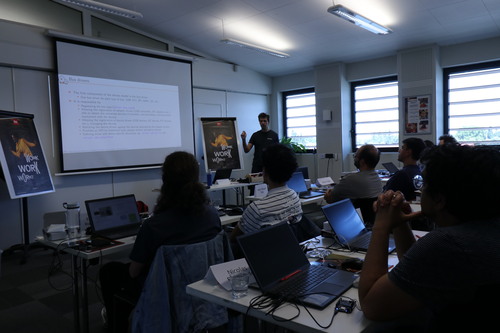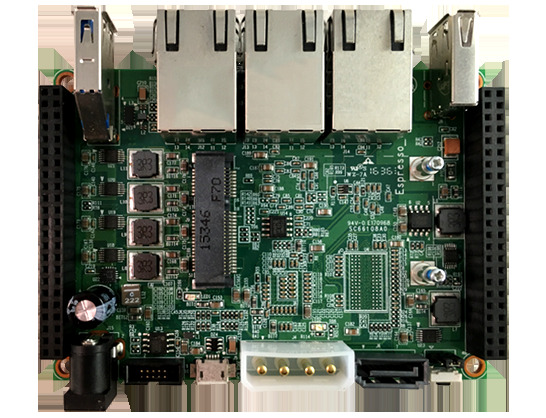Master the internals of Linux networking from driver to userspace, and learn to configure, optimize, and troubleshoot modern embedded network stacks.
Course details
![]()
- Duration: 3 days / 24 hours (on-site) – 5 half days / 20 hours (on-line)
- Agenda: on-site, on-line
- Training materials:
- Written language: English
- Available oral languages: English and French.
Types of sessions
- Private on-site session, on request
- Private on-line session, on request
- Public on-line session, dates below
Dates of public on-line sessions
| Type | Dates | Time | Duration | Language | Expected trainer |
Cost and registration |
|---|---|---|---|---|---|---|
| Embedded Linux networking (agenda) | Apr 13, 14, 15, 16, 17, 2026 |
14:00 – 18:00 (Paris, UTC+2) 08:00 AM – 12:00 PM (New York, UTC-4) |
20 h | English | Maxime Chevallier |
Discount: 899 EUR* Regular: 999 EUR* Register now |
Additional sessions at future dates will be announced progressively. We generally announce new sessions when existing ones are either full or already passed. |
*The price is excluding VAT. The online shop charges VAT, except for businesses outside of France if they provide valid company information at registration time. Businesses in France, and individuals registering by themselves must pay VAT.
The discount rate is applicable at the following conditions:
- Booking at least 1 month prior to the training session start
- Booking and payment made online using credit card
- Limit of 6 seats per training session at the discount rate
If you are unable to register through our online shop, do not hesitate to contact us, we will be able to provide a training contract and offer alternative payment methods.
Registration on the online shop remains available until the session starts, subject to seat availability.
Target audience
 This course targets engineers who need a detailed level of understanding of networking concepts, network hardware components used in typical embedded systems, and how the networking stack works in Linux.
This course targets engineers who need a detailed level of understanding of networking concepts, network hardware components used in typical embedded systems, and how the networking stack works in Linux.
At the end of this course, you will be familiar with all the elements required to efficiently configure, monitor, and optimize networking features at both the Linux kernel and user-space levels.
Objectives
- Be able to understand the overall Linux kernel networking stack and configure complex network devices
- Be able to understand the flow of network packets in a Linux system, use different socket types, generate and filter traffic
- Be able to use the eBPF and XDP technologies for improved network traffic processing
- Be able to understand the architecture of Linux kernel network drivers
- Be able to understand how Ethernet PHYs and switches are supported in the Linux kernel
- Be able to debug and troubleshoot low-level network related issues
See the detailed agenda.
Training materials
The training materials will be made available in July 2025, after the first session has been delivered.
Practical labs
 In our on-site courses, each lecture is followed by a practical lab done by the participant. The practical labs represent 50% to 60% of the whole course time. Labs are performed an embedded ARM board, the EspressoBin, which is powered by the Marvell Armada 3720 ARM64 processor.. You will use it to configure, diagnose and troubleshoot networking as well as develop various aspects of networking applications. This experience will be relevant regardless of the specific hardware platform you will be using in your own projects.
In our on-site courses, each lecture is followed by a practical lab done by the participant. The practical labs represent 50% to 60% of the whole course time. Labs are performed an embedded ARM board, the EspressoBin, which is powered by the Marvell Armada 3720 ARM64 processor.. You will use it to configure, diagnose and troubleshoot networking as well as develop various aspects of networking applications. This experience will be relevant regardless of the specific hardware platform you will be using in your own projects.
In our on-line courses, the practical labs are performed as live demonstrations by the trainer. Participants can ask questions at any time. Optionally, the participants who have access to the necessary hardware accessories can reproduce the labs by themselves.
Keep in mind that in any case our course is hardware-agnostic, and therefore it is relevant even if the target platform for your next project is not exactly the one used for the practicall labs during our course.
Prerequisites
- Minimal experience in embedded Linux development: participants should have a minimal understanding of the architecture of embedded Linux systems: role of the Linux kernel vs. user-space, development of Linux user-space applications in C. Following Bootlin’s Embedded Linux course allows to fulfill this pre-requisite.
- Experience with low-level development in Linux and hardware interfaces: participants should have a minimal understanding of memory management, interaction with common hardware interfaces (registers, interrupts), the interaction between Linux user-space applications and the Linux kernel (system calls). Following Bootlin’s Linux kernel driver development course allows to fulfill this pre-requisite.
- Minimal English language level: B1, according to the Common European Framework of References for Languages, for our sessions in English. See the CEFR grid for self-evaluation.
Hardware requirements
- For on-line courses:
- Computer with the operating system of your choice, with the Google Chrome or Chromium browser for videoconferencing.
- Webcam and microphone, from an audio headset
- High speed access to the Internet
- Optionally: the hardware accessories needed for the practical labs, if you want to reproduce the practical labs by yourself. Note that this is not mandatory: you can follow the course without those hardware accessories, as the trainer will perform the practical labs as live demonstrations.
- For on-site courses:
- Training room
- Video projector
- One recent PC computer for each desk (1 or 2 persons) installed with Linux. See the training agenda for detailed requirements.
- Unfiltered and fast connection to the Internet
- Bootlin provides the hardware accessories for the practical labs for the duration of the course
By the way, you can also see evaluations from previous sessions. In the same way we are transparent with our training materials, we share all the evaluations that we collect, not only the best ones.
Participants with disabilities
Participants with disabilities who have special needs are invited to contact us to discuss adaptations to the training course.
Contact
For any question, registration or comment, you can contact us:
- training@bootlin.com
- phone : +33 484 258 097
